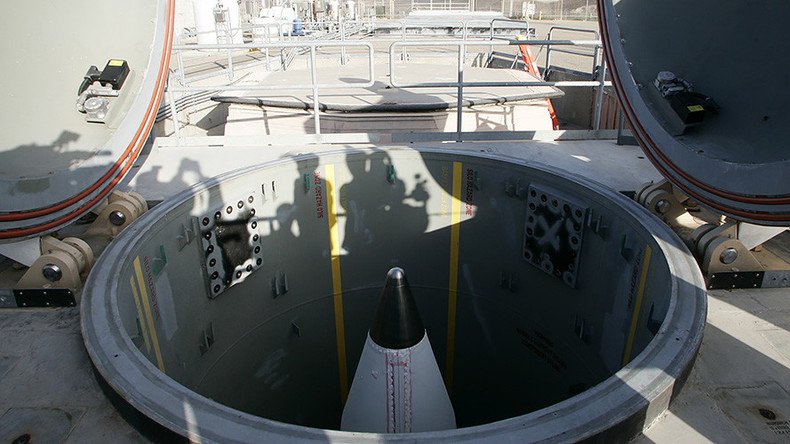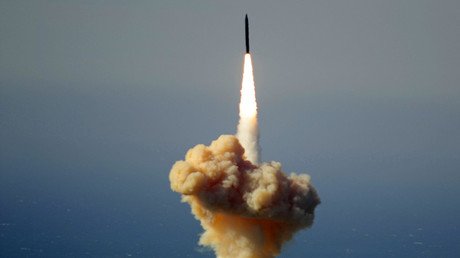Raid maintenance fund for missile defense, Pentagon asks Congress

Citing tensions with North Korea, the Pentagon has asked Congress to move $416.4 million earmarked for other purposes to missile defense programs, among other things. Some lawmakers say the transfer would hurt the military's readiness, however.
In the unclassified reprogramming request signed by Comptroller David Norquist on September 7, the Department of Defense asked Congress to transfer $330 million, the bulk of the funds, from Army operations and maintenance accounts that have not been fully used.
“This reprogramming action provides funding in support of higher priority items, based on unforeseen military requirement, than those for which originally appropriated; and are determined to be necessary in the national interest,” said the request, published this week by InsideDefense.
While many of the destinations for redirected funds remain classified, the Pentagon did not classify a number of missile defense requests, including $81 million in funding for the Ballistic Missile Defense (BMD) Midcourse Defense Segment. The funds would go toward adding 20 new Ground-based Interceptors (GBI) and silos at Missile Field 4 in Fort Greely, Alaska, boosting the number of interceptors to 64.
Missile Field 4 is one of the two ground-based missile defense units housing interceptors on the west coast. The unit was created to protect the United States from an intercontinental ballistic missile threat, according to the Pentagon.
The Defense Department also requested $47 million to procure components for 10 of the 20 new silos at Missile Field 4. The funds would go toward “long lead materials and critical sole-source supplies required for the fabrication of silos and launch site support components to construct Silo Interface Vaults (SIVs) and silos for the new missile defense field (Missile Field 4),” according to the reprogramming request.
Another $22 million was requested for new BMD sensors, with $2.6 million set aside for a new-start Medium Range Discriminating Radar (MRDR) program.
"The MRDR is needed to address gaps in the BMDS and better protect the homeland and regional allies," the document says. "The MRDR will include BMDS threat discrimination improvements to enhance BMD effectiveness against the evolving threat."
An additional $16 million would go to extend the lifespan of the COBRA DANE radar, which the Pentagon says “provides critical coverage of North Korean threats.”
Another $61 million would go toward testing the Standard Missile-3 (SM-3) Block IIA missiles on Aegis BMD ships, with $13 million for upgrading four of the ships to enable SM-3 launches and increase capacity.
The Pentagon further requested $48 million to fund classified cyber technology development, and $6 million for classified "air and missile defense systems engineering."
The request would require congressional approval to take the money from unspent Army and Army Reserve operations and maintenance accounts allocated in the fiscal 2017 budget.
Senator Dan Sullivan (R-Alaska), a member of the Senate Armed Services Committee, said he does not foresee any issues with the Pentagon getting the transfer approved.
“I think it’s a really good idea,” Sullivan told The Hill on Thursday. “My view is we need to be accelerating that. I think that’s going to be moving. I have not heard of any [roadblocks].”
#NDAA of 2018 authorizes additional $8.5 billion for Missile Defense Agency, $650 mil above Trump admin's request https://t.co/C1s0iAd2b6pic.twitter.com/hvKntbttzd
— RT America (@RT_America) September 18, 2017
However, Rep. Adam Smith (D-Washington), the ranking member of the House Armed Services Committee, said transferring the funds to build up the missile defense program would hurt the military’s readiness.
“Mr. Smith has significant concerns about taking that much money from near-term readiness and putting into missile defense programs that will not have an impact until the 2020s at the earliest,” the congressman’s spokesman told Defense News.
In June, Pentagon officials told the Government Accountability Office (GAO) auditors that “the result of the current state of readiness is that military forces are not strong enough to protect vital US national security interests from worldwide threats.”
They listed the threats as “Russian aggression in Europe and North Korea’s provocative threats in the Asia-Pacific.”
In August, President Donald Trump said his administration would increase spending on missile defense by “many billions of dollars.”
“We are going to be increasing our budget by many billions of dollars because of North Korea, and other reasons having to do with the anti-missile,” Trump said, according to Defense News.













